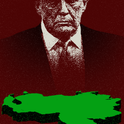I am having trouble expelling the Norwegian terrorist, Anders Behring Breivik, from my mind. Ever since it emerged that Islamist extremism was not the bogeyman behind Norway’s day of murder, it has been difficult to agree on a language or way of thinking about the attacks.
The diffidence and confusion, in the middle of Norway’s extreme grief, has been understandable. Breivik’s 25th July court appearance briefly posed the dilemma about whether he should be allowed to appear in his made-up knight’s uniform and to articulate his psychopathic views. Partly on the basis of security, partly because he clearly craves nothing other than a platform, the Norwegian authorities quite sensibly decided to keep a lid on Breivik. He arrived at the court out of sight. The only picture we got of him was as he was driven away, smiling his placid smile.
My instinct says this is wrong. People will find out—in some incomplete form, anyway—what is in Breivik’s mind. He has posted a 1500-page confessional manifesto on the internet and has a 12-minute video of martial images and right-wing nonsense running nonstop on YouTube. People are curious as well. By killing 76 people on a Friday afternoon in one of the world’s safest and most prosperous countries, Breivik, however unfairly, has got our attention. We should use this moment to interrogate his thinking, despite our reluctance to admit that his actions might have had any basis in a rational mind.
When his lawyer Geir Lippestad told us that Breivik was insane, it was noticeable how gratefully the newspapers and the radio stations grabbed this information. It added another phrase to the language that we had already started to use to distance ourselves from him: lone gunman, secret life, delusional, cold.
I am struck by what seems to me to be the difference between how we are approaching the problem of Breivik and how we have attempted to understand attacks by Europe’s more accustomed nemesis, Islamist extremism. Let’s say that the attacks had been perpetrated by a cell of young, fanatical Pakistani immigrants to Norway. They had done the usual things: made their confessional video in front of a scary banner covered in Arabic phrases in a flat on the outskirts of Oslo; been radicalised and steered by a supposedly influential cleric in Egypt, or Yemen.
If this had happened, then we would have accepted, almost without hesitating, that these boys were marginalised, were brainwashed, were fragile, had fallen off the deep-end. This would be so obvious (there would be the calamitous event that turned a gentle teenager into a cold and distant young man, his life increasingly embedded in the mosque until they chucked him out and reported him to the police who ignored the warning) that it would scarcely be interesting. We would spend most of our energy launching ourselves into another round of conversation involving words like "immigration" and" multiculturalism" and "failure." We would feel tormented, and sad, not least because the shape of the disaster is so familiar and it keeps recurring.
By contrast, we are more concerned with Breivik as an individual. It’s true there has been reporting about his contact with other right-wing “anti-jihad” groups in the UK and in Europe, but there is nothing like the instinctive interest in the idea that he is part of a wider movement of violence that threatens us. It is inexplicable, in logical terms at least, that we don’t really believe that there are more “cells” of people like him out there, stockpiling dum-dum bullets and police uniforms, about to launch attacks in Paris or Leeds. But we do not. And we are probably right not to.
I think that is because we are instinctively familiar with Breivik's arguments and fears. They belong to the same family of diatribes that we hear from the BNP and EDL: the absolute conviction that a white, Christian way of life is dissolving in the weak, liberal hands of our leaders; that our once-great minds have gone mushy, fatally so; and the next minute we will be woken by the muezzin to Sharia law, enacted by a dark man with a beard.
We have heard this paranoia before, seen these men and their St George’s flags on their marches. We know they are frustrated. We know they are capable of starting a riot. But we also know that they are wrong and weak.
Here is my thought: because we are basically familiar with the cultural and political context of Breivik, because we know what he is talking about, we are able to see him in proportion. Yes, he is mad, but he is also a reminder that real violence does lurk in Europe’s right-wing, “culturally conservative” movement. So we should be alive to that.
What I have found much more interesting than this is the idea that what I feel today towards Breivik might just approximate to what educated, middle-class Muslims have been feeling towards their terrorist brethren over the last decade. Breivik is an outlier in the civilisation that I belong to. His beliefs and enemies are an almost uncanny parallel to those held by al Qaeda and other militant groups. He evokes an essentially medieval view of the world, finding his heroes in the Knights Templar of the Crusades. He identifies himself as a Christian in a way that no normal Christian would. His ultimate enemy, of course, is the infidel, but in the meantime, the first stage of the war must be to rid the supposedly pure lands of Europe from the “cultural Marxists” and liberal elites who are leading it to destruction. Al Qaeda’s fixation with the inadequate Islamic regimes and colonial puppets in the Middle East is right there, staring back at us from Breivik’s airbrushed face.
Because I live in Europe, in a powerful country, with a political class and a media that knows about Western Christian civilisation and can see the patent baloney, the hokey nonsense of Breivik and his 60-year crusade to rid Europe of cultural Marxism, I feel no threat from his ideas. I can see how marginal he is. This must be how sensible people living in Arabic countries must have felt when they first heard of bin Laden and talk of a worldwide caliphate. This has nothing to do with me. This is quite mad. The idea that I could ever, even in the most tangential, theoretical way, be tarred by some kind of association with this interpretation of the world and its politics does not even cross my mind, even if I share some of the same primary identifiers: Muslim, politically-repressed, uneasy about Israel.
This is why we have stopped using the word terrorism, or dilly-dallied around it, to describe the Norway attacks. Because what would we call Breivik? A Christianist terrorist? A conservative terrorist? A Europeanist terrorist? An anti-cultural Marxist terrorist? The language makes no sense. We know it is not accurate enough. We know it aggrandises him, provides an intellectual background for his ideas that we know—because we know the ideas—is not valid. So we eschew these words and these organising labels and we call him what we know him to be: lone gunman, secret life, delusional, cold, mad.
Breivik's terrible attack tells us that paranoid Europeans of his stripe are truly dangerous. If we suspected it, we know it now. But the larger opportunity that he represents, is a spur to see things clearly. This is the parting of Rawls’s veil of ignorance: a moment, for non-Muslims, when we are finally equipped to imagine what it must have felt like for the last fifteen years to see a philosophy stolen, a faith awarded to madmen, mistaken associations and connections written straight across a culture by those who do not know it. If we are not going to make that mistake with Breivik, then we should not do it to anyone else.
This piece originally appeared at http://samknightnet.wordpress.com/
Terrorists or outliers?
August 11, 2011












